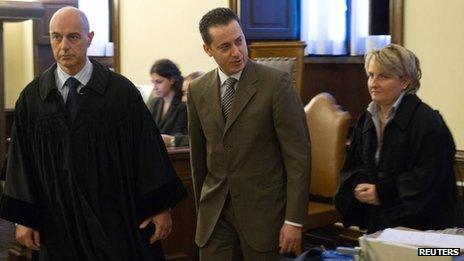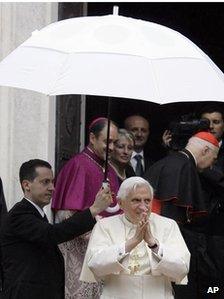Butler Gabriele sentence unlikely to end Pope scandal
- Published

Paolo Gabriele's trial has hijacked the Vatican's autumn religious news agenda
The 18-month prison sentence handed down by the Vatican City criminal court on Pope Benedict's former butler, Paolo Gabriele, may mark not the end but the beginning of a complex story of betrayal and discontent at the very heart of the Catholic Church.
Some of the hundreds of sensitive documents stolen from the Pope's desk over an extended period found their way into the Italian mainstream media and into a bestselling book earlier this year.
Pope Benedict wanted closure on the Gabriele case and he got it, only hours before the start of the most important Vatican event of the year, which begins on Sunday.
He has called a three-week long Synod of Bishops from around the world to advise him on how to spearhead what the Vatican is optimistically calling "The New Evangelisation".
This is code for a high-octane effort by the Catholic Church to counter the insidious spread of secularism within countries - particularly in Europe - that once confidently proclaimed themselves Catholic, but where Sunday mass attendance is now falling yearly to ever-lower levels.
The butler trial has hijacked the Vatican's planned autumn religious news agenda and has concentrated world attention on yet another episode contributing to the credibility crisis affecting the Holy See.
Lucrative offers
Sunday's edition of the Vatican newspaper, Osservatore Romano, predictably put a brief report on the butler trial at the bottom of its back page.
In theory, under a treaty signed between the Vatican and Italy in 1929, people convicted of crimes carried out in Vatican territory serve their sentences in Italian jails, as there are no suitable long-term detention facilities within Vatican City State.

The former butler is not expected to appeal against his sentence
But if Gabriele, a Vatican citizen, were to be transferred to a jail in Italy, he might be tempted by lucrative offers to reveal other details about what he learned while in the Pope's service.
His lawyer has indicated that the former butler does not intend to appeal and is ready to serve his sentence by remaining under house arrest in his "grace and favour" apartment situated inside the walls of Vatican City.
However, a second embarrassing trial looms.
In about a month, the Vatican court is due to hear the case against Claudio Sciarpelletti, a computer technician who worked in the Vatican's Secretariat of State - the equivalent of the papal Cabinet Office.
He was originally charged with aiding and abetting Mr Gabriele in his theft of documents, but the Vatican judges decided to hold his trial separately.
Mr Sciarpelletti has called as one of his witnesses the first upper-level cleric - other than the Pope's personal secretary - to give evidence in the Vatileaks scandal. He's an Italian monsignor in charge of documentation in the Secretariat of State.
The Vatican prosecutor is also considering further possible, and more serious, charges against both Paolo Gabriele and Claudio Sciarpelletti - including violation of state secrets and attacking state security. These would involve heavier punishments than for aggravated theft.
The newly-appointed Vatican communications strategist, Greg Burke, formerly a Fox News TV correspondent, admits that the Pope has personally been very upset about the Vatileaks scandal.
He told the BBC: "There are four or five people in the world who have the chance every day to talk to the Pope and get five minutes of him with no distractions. Paolo Gabriele could have done it that way. Instead, he went off and caused the scandal that it became."
- Published6 October 2012
- Published5 October 2012
- Published3 October 2012
- Published2 October 2012
- Published29 September 2012